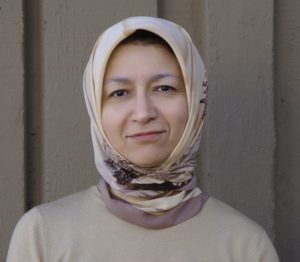
 By Maha Elgenaidi
By Maha Elgenaidi
Civil liberties are indivisible. Denying the freedom of one group threatens the freedom of others. That’s the situation we face now with the escalating attacks on the religious freedom of Muslims.
The root of the problem lies, as it always does, with bigotry in beliefs and attitudes.
When Americans were asked to rate their feelings of warmth or coldness towards people of different religions, they rated their feelings toward Muslims as the “coldest” of all religious groups: 48 out of 100, with the latter representing the “warmest” feeling. Asked whether American values comport with Islamic values, 56 percent of the general public — and 73 percent of white evangelical Christians — said they do not.
These beliefs and attitudes lead to foreign policies that threaten war and to domestic policies and campaigns that violate Muslims’ religious freedom, as shown by the proliferation of anti-Sharia bills, resistance to mosque construction, and the rise in anti-Muslim hate crimes and incidents.
The travel ban, heard recently by the U.S. Supreme Court, exemplifies this threat. It not only blocks Muslim immigrants, but it also disrupts lives and livelihoods. It interferes with Muslim businesses. It tears families apart, preventing many from seeing their children and grandchildren who live in the United States. During oral arguments, Justice Elena Kagan aptly compared it to a hypothetical ban on travelers from Israel by a future anti-Semitic president.
But policies that deny anyone’s religious freedom should also concern others, because when we deny religious freedom and civil liberties to one group it sets a dangerous precedent for the rest. Imagine if future presidential administrations were openly hostile toward Christians overseas, municipal governments opted to reject new church plants, and non-theists pursued policies restricting the practice of Christianity in public places. When it comes to religious liberty, more is better — for everyone.
Countering Islamophobia and repairing the damage that’s already been done to Muslim Americans under the current political environment must begin with education and much more interreligious engagement.
We have more in common than we have differences.
Islam shares many beliefs with Christianity, such as the oneness of God, revelation through prophets and sacred texts, the resurrection of the dead and final judgment, and a deep reverence for Jesus and belief in his virgin birth, his miracles, and his second coming to battle the Antichrist.
Islam also embraces religious freedom and respect for minority rights, as affirmed in the Marrakesh Declaration. It invites Christians to interfaith dialogue in the document called “A Common Word Between Us and You.” And hundreds of leading Muslim scholars have repeatedly and vigorously denounced terrorism, Shaykh Muhammad Al-Yaqoubi and Shaykh Abdullah Bin Biyyah being among the most prominent. These statements are drafted not by some progressive fringe but by traditional Muslim scholars, reflecting majorities of mosques.
Also, Muslim Americans are like many Christian Americans, as a 2007 Pew survey revealed. We are mostly mainstream and middle class. The most recent Pew study finds Muslims concerned about rising Islamophobia but still mostly satisfied with their lives.
So let’s build upon our shared beliefs and values and common concerns for religious freedom to join forces institutionally and more intentionally to combat threats to religious liberty for all of us. My religion teaches me that diversity is the will of God (Qur’an 49:13). It’s a value that I put into practice daily in the work I do at Islamic Networks Group because I recognize that the alternative is religious freedom for none.
Maha Elgenaidi is the founder and Executive Director of the Islamic Networks Group, a nonprofit organization with affiliates and partners around the country that are pursuing peace and countering all forms of bigotry through education and interfaith engagement, working within the framework of the First Amendment’s protection of religious freedom and pluralism. Visit ing.org to view programs and resources.
This article appeared in the May/June 2018 edition of Report from the Capital. You can read a digital version of the magazine or view it as a PDF document.




